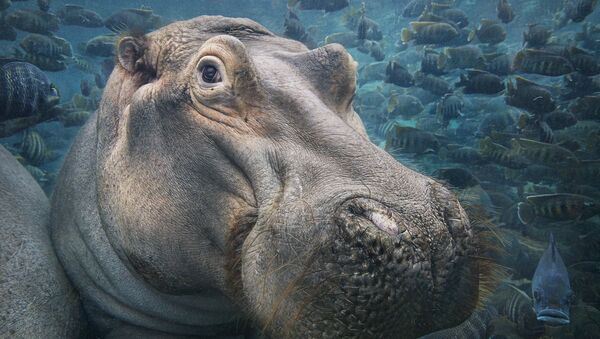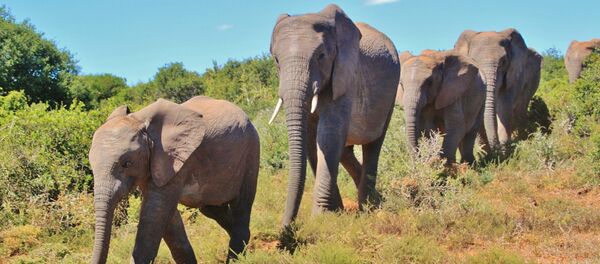Bwabwata, a national park primarily dedicated to the preservation of Namibia's African elephants, is the site of the mass hippo die-off. Park officials say that they believe that bacillus anthracis, the bacteria that causes anthrax, entered the park's water supply.
"This is a situation that we have seen before," said Colgar Sikopo, director of parks and wildlife management at Namibia's Ministry for the Environment and Tourism, to state-owned outlet New Era. "It happened in Zambia before and it mainly occurs when the level of the river is so low… Our scientist will advise properly, but we suspect it is anthrax."
Más de 100 hipopótamos mueren en #Namibia.https://t.co/zSVGmTasCb pic.twitter.com/uQwPzt5J04
— TH Televisión (@TabascoHoyTV) October 10, 2017
"This is a natural cause and with the animals dying people should not panic, as it won't negatively affect tourism in the area," he added.
Previous outbreaks were not nearly so deadly because anthrax is not a particularly infectious disease. The spores usually enter the body through the consumption of infected meat or via the handling of infected animal products. While the spores can survive in the Earth for many years, they aren't dangerous unless something releases them.
Anthrax can also be found in pools of stagnant water that form during heat waves and dry seasons. If that stagnant water makes its way into a larger body of water, or if an overheated hippo splashes around in an infected pool, then the outbreak could quickly spread to the rest of the colony. An estimated 1,300 hippos lived in Namibia before the outbreak.
Más de 100 hipopótamos mueren en #Namibia por una #grave bacteria https://t.co/uKvYu4puer pic.twitter.com/HijJndHGEC
— Foro Coatza (@ForoCoatza) October 10, 2017
Pohamba Shifeta, Namibia's Environmental Minister, told AFP that there were concerns that crocodiles may have eaten some of the hippo carcasses, which could spread the disease further. There is also worry that humans will ingest the tainted flesh.
"We strongly advise that [humans] must not consume this meat. What we are doing is we are trying our best to burn every carcass to prevent further spreading of the disease, but also to ensure that no person gets to these animals and starts feeding on the meat," Sikopo said.
Anthrax outbreaks are fairly common among animals, even large mammals. A 2004 outbreak in Uganda left 300 hippos dead, and a heatwave in Siberia led to 2,400 reindeer (and one human child) dying from anthrax infections.
Anthrax outbreaks are exceedingly rare among humans, and have usually occurred as the result of military activity, such as the imperial Japanese testing of biological and chemical agents on mostly Chinese test subjects at Unit 731 during World War 2 (killing tens of thousands of civilians), or the 1979 Sverdlovsk anthrax leak, where human error at a Soviet missile site released anthrax spores into the air and killed approximately 100 people.
The most famous incident in the US was the 2001 attacks, during which anthrax spores were mailed to multiple American newspapers, TV news outlets and Democratic senators. The crimes, which killed five and infected 17 others, weren't solved until 2008.
The FBI accused US government bio-defense researcher Bruce Ivins of the crime shortly after his suicide. The FBI's conclusion has been disputed by scientists, who claim that there's no way to track the anthrax samples back to any one individual.




